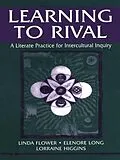This monograph examines the concept of the rival hypothesis stance and how learners use rivaling, particularly in intercultural settings. For scholars in composition studies, literacy, service learning, rhetoric, teacher training, & argument.
Autorentext
Linda FlowerElenore LongLorraine Higgins
Zusammenfassung
This book presents the complete collection of peer-reviewed presentations at the 1999 Cognitive Science Society meeting, including papers, poster abstracts, and descriptions of conference symposia. For students and researchers in all areas of cognitive science.
Inhalt
Contents: C. Bazerman, Editor's Introduction. Part I:Perspectives on Inquiry. L. Flower, L. Higgins, E. Long, Preface: A Note on Intercultural Inquiry and Method. L. Flower, The Rival Hypothesis Stance and the Practice of Inquiry. L. Flower, An Experimental Way of Knowing. Part II:Intercultural Understanding and Academic Practice. L. Flower, E. Long, Tracking a Literate Practice: The Aseka Question. L. Higgins, The Opening Question: How Do Students Learn the Rival Hypothesis Stance? E. Long, L. Flower, D. Fleming, Encounters With Conflict. E. Long, D. Fleming, L. Flower, Rival Hypothesis Thinking in Action: Dilemma-Driven Literate Acts. L. Flower, S. Lawrence, D. Cook, Tracking a Literate Practice Across Disciplines: The Rival Hypothesis Stance in Biology and History. Part III:Rivaling and the Practice of Community Literacy. E. Long, L. Flower, D. Fleming, P. Wojahn, Rivaling in School and Out. E. Long, D. Fleming, L. Flower, Rivaling at the CLC: The Logic of a Strategic Process. L. Flower, Acts of Negotiation. E. Long, L. Higgins, L. Flower, Conclusion: Some Provisional Understandings.
